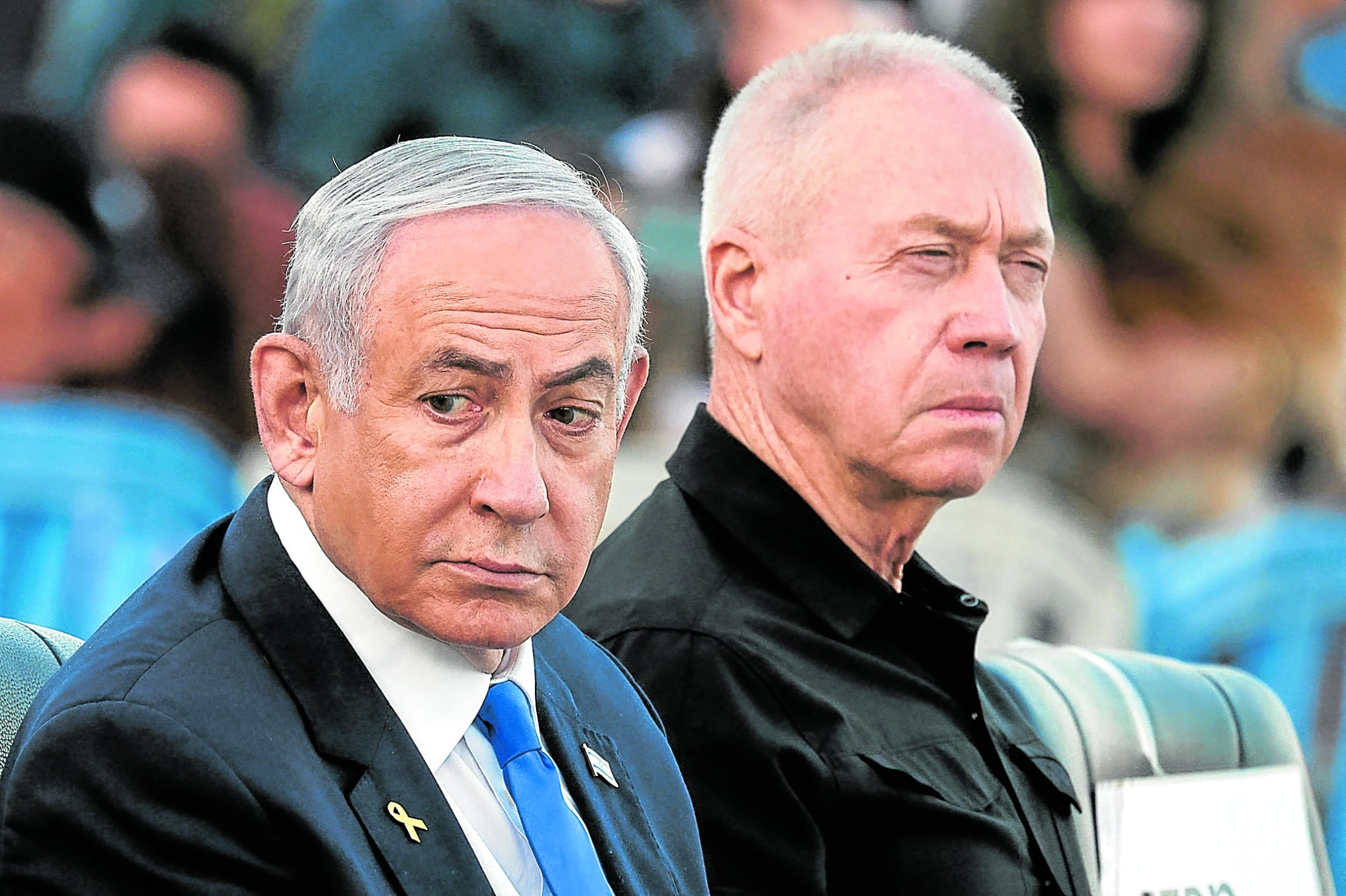World leaders divided over ICC arrest warrant on Netanyahu

WANTED IN THE HAGUE Israeli Prime Minister Benjamin Netanyahu and Defense Minister Yoav Gallant attend a military ceremony in October before the defense chief was fired early this month over his differences with Netanyahu in the handling of the conflict in Gaza and Lebanon. —REUTERS
PARIS — World leaders were divided over the arrest warrants that the International Criminal Court (ICC) issued on Thursday against Israeli Prime Minister Benjamin Netanyahu and his ousted Defense Minister Yoav Gallant, with some saying they disagreed with the issuance of the warrants even as they noted that they were bound to enforce the orders.
The ICC also issued a warrant on Hamas military chief Mohammed Deif—in response to accusations of crimes against humanity and war crimes in Israel’s war on Hamas in Gaza, set off by the militant Palestinian group’s Oct. 7, 2023, attack.
The court urged member states to enforce “a policy of severing contact and meetings” with Netanyahu and Gallant.
Netanyahu in a statement said: “The anti-Semitic decision of the International Criminal Court is comparable to the modern-day Dreyfus trial—and it will end in the same way.”
He was referring to the 19th-century Alfred Dreyfus affair in which a Jewish army captain was wrongly convicted of treason in France before being exonerated.
Article continues after this advertisementREAD: Netanyahu says ICC warrant won’t stop Israel defending itself
Article continues after this advertisementIsrael “rejects with disgust the absurd and false actions and accusations made against it,” Netanyahu said, again saying that the judges were “driven by anti-Semitic hatred of Israel.”
The United States said it “fundamentally rejects” the ICC’s decision.
Biden’s stand
“We remain deeply concerned by the prosecutor’s rush to seek arrest warrants and the troubling process errors that led to this decision,” said a National Security Council spokesperson. “The United States has been clear that the ICC does not have jurisdiction over this matter.”
US President Joe Biden himself, in a statement on Thursday, called the warrants on the top Israeli leaders “outrageous.”
“Whatever the ICC might imply, there is no equivalence—none—between Israel and Hamas,” Biden said. “We will always stand with Israel against threats to its security.”
Posting on X, Argentine President Javier Milei said the warrant “ignores Israel’s legitimate right to self-defense against the constant attacks by terrorist organizations like Hamas and Hezbollah.”
Contradiction
But Josep Borrell, foreign policy chief of the European Union, said the warrant “is not a political decision.”
“It is a decision of a court, of a court of justice, of an international court of justice. And the decision of the court has to be respected and implemented,” he said.
But there has been some contradiction among EU’s member states, with Italy’s Defense Minister Guido Crosetto saying his country would be obliged to arrest Netanyahu and Gallant if they visited, no matter that he thinks the ICC is “wrong” to put Netanyahu on the same level as Hamas.
Reactions by Israelis, Hamas
Prime Minister Viktor Orban of Hungary said on Friday he would invite Netanyahu to visit and assure him that the ICC’s warrants would “not be observed.”
Germany said it will carefully examine the warrants, but will not take further steps until a visit by Netanyahu is planned.
Cyprus, which has close ties with Israel, said it still considers arrest warrants issued by the ICC as binding in principle.
The Palestinian Authority, a rival of Hamas, said “the ICC’s decision represents hope and confidence in international law and its institutions.”
Hamas political bureau member Bassem Naim said of the warrants against the Israeli leaders: “[It’s] an important step toward justice and can lead to redress for the victims in general, but it remains limited and symbolic if it is not supported by all means by all countries around the world.”
Yael Vias Gvirsman, who represents 300 Israeli victims of the Oct. 7, 2023 Hamas attacks, said the “arrest warrant against Mr Deif is massively significant.”
“It means these victims’ voices are being heard,” she added, speaking from outside the court in The Hague on Thursday.
In March last year, the ICC issued arrest warrants on Russian leader Vladimir Putin and his commissioner on children’s rights, Maria Lvova-Belova, in connection with the “unlawful deportation” of Ukrainian children to the Russian Federation.